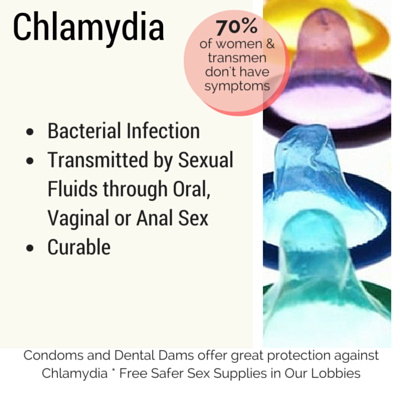Chlamydia

Chlamydia
Chlamydia is a sexually transmitted infection (STI) that affects all genders. It is currently the most common STI, infecting approximately four million people a year. Chlamydia is a bacterial infection, that is curable with antibiotics. It spreads through sexual fluids via oral, vaginal or anal sex.
Symptoms
- About 70% of the women and trans men with chlamydia have no symptoms. They may have it for years without being diagnosed.
For women and trans men who do have symptoms, they include an
- unusual vaginal discharge
- irregular vaginal bleeding
- pelvic pain
- painful urination
- swollen glands near the groin.
About 10% of men and trans women have no symptoms. In men and trans women who have symptoms, they include a
- drip or discharge from the penis
- painful urination.
What Are The Health Problems Associated With Chlamydia?
- In women and trans men, chlamydia usually begins with an inflammation of the cervix.
- The long-term health effects of chlamydia remain unclear.
- The medical profession speculates that chlamydia could be a cause of sterility in women and trans men if the chlamydia infection were to spread into the uterus and tubes, causing a pelvic infection and scarring in the tubes (Pelvic Inflammatory Disease or PID)
- Many women and trans men that have chlamydia do not get PID and not all people with PID have a chlamydia infection.
- A woman or trans man can also transmit chlamydia to her/his infant during birth. This can cause pneumonia if it spreads to the infant's lungs or blindness if it infects the eyes.
- In men and trans women, chlamydia may cause urethritis, which is an inflammation of the urethra referred to as NGU or NSU. If this remains untreated, it may also cause sterility.
How Is Chlamydia Transmitted?
Chlamydia is passed to sexual partners during unprotected vaginal, anal and/or oral intercourse.
Confidential Testing
Get tested for Chlamydia at any WHS clinic. We test people of all genders. It's a simple urine test, with the results delivered in the way that is easiest for you.
It can take at least three weeks for chlamydia to show up in a urine test. It's important to wait at least three weeks after the date of your possible exposure, before being tested, so your test is correct.
Treatment
If you are diagnosed as having chlamydia, your sexual partners(s) should be treated as well. You are at risk to be re-infected without treating sexual partners or using condoms.
Chlamydia is treated with antibiotics prescribed by your provider.
Test Your Knowledge
1. True or False: A person of any gender can give chlamydia to a person of any gender.
2. True or False: Condoms are a HIGHLY effective way to prevent the transmission of Chlamydia.
3. True or False: The infection rate is highest in people under 25.
4. True or False: If you're have anal, vaginal or oral sex, the only way to know if you've been exposed is to get tested.
5. True or False: Most people will have a sexually transmitted infection during the course of their lifetime.
All True!